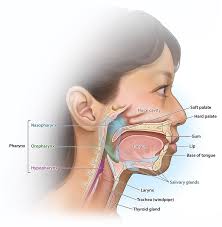Oropharyngeal Cancer (Tongue, Tonsils, Soft Palate)

Overview
Oropharyngeal cancer develops in the oropharynx, the middle part of the throat behind the mouth, including the back of the tongue, tonsils, soft palate, and pharyngeal walls. It is most commonly a squamous cell carcinoma and is increasingly linked to human papillomavirus (HPV) infection, especially in younger non-smokers.
Symptoms
- Persistent sore throat
- Difficulty swallowing (dysphagia)
- Lump in the neck (swollen lymph node)
- Ear pain
- Voice changes
- Weight loss
- Bleeding in the mouth or throat
Causes & Risk Factors
- HPV infection (especially HPV-16)
- Tobacco use (smoking and chewing)
- Heavy alcohol consumption
- Male gender and age over 40
- Poor oral hygiene
Diagnosis
- Physical and endoscopic examination of the throat
- Biopsy of suspicious lesions
- Imaging: MRI, CT scan, or PET scan to assess spread
- HPV testing (p16 or DNA analysis) to determine viral cause
Treatment Options
- Surgery (transoral robotic surgery for HPV-positive cases)
- Radiation therapy
- Chemoradiation (common for advanced stages)
- Immunotherapy for recurrent/metastatic disease
- Speech and swallowing therapy post-treatment
Prognosis
- Prognosis depends on HPV status and stage:
- HPV-positive tumors: better response and survival (5-year survival ~85%)
- HPV-negative tumors: lower survival rates
- Early-stage cancers have higher cure rates
Living with this Cancer Type
- Nutritional support (feeding tube may be needed temporarily)
- Dental and oral care during radiation
- Long-term speech and swallowing rehab
- Emotional and social support
Prevention & Screening
- HPV vaccination (for prevention of HPV-related oropharyngeal cancer)
- Avoidance of smoking and alcohol
- Regular dental/oral exams
FAQs
Q: Is oropharyngeal cancer contagious?
A: The cancer itself is not, but the HPV virus linked to some cases is sexually transmissible.
Q: Is HPV-related oropharyngeal cancer curable?
A: Yes, it generally has an excellent prognosis with proper treatment.
Q: Can I get screened for oropharyngeal cancer?
A: No formal screening exists, but regular oral exams may detect early signs.
Resources
- Head and Neck Cancer Alliance
- Oral Cancer Foundation
- ClinicalTrials.gov (search: “oropharyngeal cancer”)
Understand Precision Testing
Learn how liquid biopsy and chemo sensitivity testing can personalize your treatment plan.
Make Informed Decisions
Gain knowledge to actively participate in treatment discussions with your healthcare team.
Improve Treatment Outcomes
Discover how precision medicine and metabolic therapies can enhance treatment effectiveness.
Start Your Educational Journey Today
Empower yourself with knowledge about precision metabolic oncology and take an active role in your cancer care journey.
Need More Information?
Our team of oncology experts is here to help you understand your diagnosis and treatment options.
